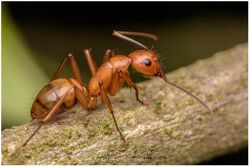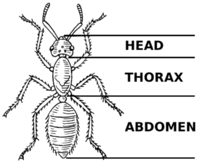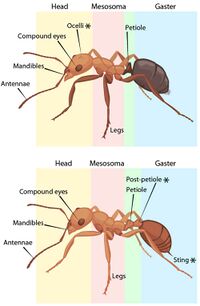Formicidae
Overview

Formicidae is a family, containing ants, that belongs to the order Hymenoptera, which contains the ants close relatives bees and wasps. It's estimated that there are 22,000 species of ants, with roughly 15,000 of these species being classified. [1] They are incredibly numerous, being found everywhere in the world except for Antarctica as well as Greenland, Iceland, Hawai'i, and some Pacific Islands that don't have native species. [2] The mass of all the ants in the world is said to be greater than the mass of all birds and mammals combined, with an estimated human-to-ant ratio of 1:2,500,000. [3]
Taxonomy
- Kingdom- Animalia (Animals)
- Phylum- Arthropoda (Arthropods)
- Class- Insecta (Insects)
- Order- Hymenoptera (Ants, Bees, and Wasps)
- Infraorder- Aculeata (Ants, Bees, and Wasps)
- Superfamily- Formicoidea (Ants)
- Family- Formicidae (Ants)
- Superfamily- Formicoidea (Ants)
- Infraorder- Aculeata (Ants, Bees, and Wasps)
- Order- Hymenoptera (Ants, Bees, and Wasps)
- Class- Insecta (Insects)
- Phylum- Arthropoda (Arthropods)
Description


Most ant species found will be either red, brown, or black in color. [2] They can range anywhere from 1/16 of an inch long (Crazy Ant) [4], up to 1.6 inches long (Dinoponera, thought to be the biggest ant species in the world, found in South America). [5] Most common ants, however, are 1/16 to 1/2 an inch long. [6] Their bodies are broken down into three main segments (Figure 1), with the thorax and the abdomen being further broken down into three more subsegments (Figure 2).
Head
Thorax
Abdomen
Mesosoma
Petiole
Gaster
Common Species in the Northeastern USA
Life Cycle
Effects on Soil
References
[1] https://en.wikipedia.org/wiki/Ant